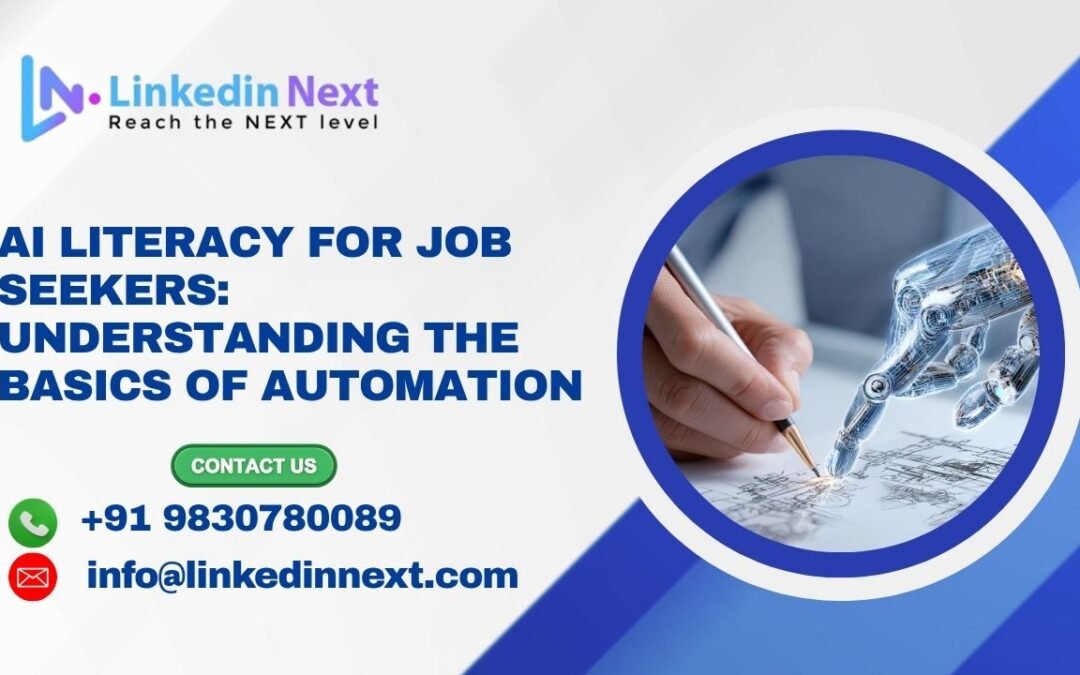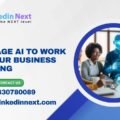AI Literacy for Job Seekers — Understanding the Basics of Automation
AI Literacy for Job Seekers — Understanding the Basics of Automation. As Artificial Intelligence (AI) continues to transform industries worldwide, job seekers in 2025 face a pivotal challenge: understanding and leveraging AI and automation to remain competitive. AI is no longer confined to tech companies—it has penetrated finance, healthcare, marketing, manufacturing, and even creative industries. For modern professionals, AI literacy is now a fundamental skill, just like reading, writing, or digital literacy once were.
This article explores why AI literacy is essential for job seekers, what it entails, and how understanding automation can enhance employability and career growth.
Why AI Literacy Matters for Job Seekers
1. Automation Is Ubiquitous
AI and automation technologies are being deployed to streamline workflows, optimize decision-making, and reduce repetitive tasks. From chatbots handling customer queries to predictive analytics informing business strategies, AI touches almost every job function.
Job seekers who understand AI basics can better navigate roles that involve AI tools, collaborate with AI-driven systems, and even leverage automation to improve productivity. Without this understanding, candidates risk being outpaced by AI-savvy peers.
2. Enhances Career Adaptability
The AI revolution is continuously reshaping job requirements. Tasks that were once manual are now automated, and new roles demanding AI-related skills are emerging. AI literacy empowers job seekers to adapt to shifting job landscapes and pivot into high-demand roles.
Examples include:
-
Learning to interpret AI-generated insights for decision-making.
-
Automating routine reporting tasks using AI tools.
-
Collaborating with AI-assisted project management systems.
Key takeaway: AI literacy is a bridge between traditional skills and future-proof careers.
3. Demonstrates Digital Competence
Employers increasingly value candidates who can interact with AI tools confidently. Familiarity with AI-driven platforms signals not only technical aptitude but also problem-solving, initiative, and strategic thinking.
Job seekers who can showcase AI literacy are more likely to be considered for roles that integrate automation and digital transformation, regardless of industry.
Core Components of AI Literacy
AI literacy is not about becoming a machine learning engineer. It is about understanding how AI works, its applications, and its implications. Key components include:
1. Understanding AI Fundamentals
Job seekers should know:
-
The definition of AI and machine learning.
-
How AI differs from traditional software (learning vs. programming).
-
Examples of AI applications in their industry.
Example: In marketing, AI is used for personalized recommendations, social media analytics, and content automation.
2. Familiarity with Automation Tools
Automation is an extension of AI. Job seekers should identify tools that increase efficiency in their roles, such as:
-
AI writing assistants (e.g., ChatGPT, Jasper) for content creation.
-
Predictive analytics platforms for finance, sales, or healthcare.
-
Robotic Process Automation (RPA) for repetitive business processes.
Understanding these tools allows candidates to demonstrate practical AI skills in interviews and workplace scenarios.
3. Data Literacy
AI thrives on data. Job seekers must be comfortable:
-
Reading and interpreting data dashboards.
-
Understanding basic statistics and trends.
-
Recognizing how data informs AI decision-making.
Key takeaway: Data literacy complements AI literacy, enabling job seekers to extract insights and make informed decisions.
4. Ethical and Critical Awareness
AI is powerful, but it raises ethical considerations. Job seekers should understand:
-
Bias and fairness in AI decision-making.
-
Privacy and data protection regulations.
-
Limitations of automation in decision-making.
Employers value candidates who can critically evaluate AI outputs, ensuring human judgment is integrated where necessary.
AI Literacy Across Different Job Roles
1. Marketing and Sales
AI assists with customer segmentation, campaign automation, and predictive analytics. Marketers who understand AI can improve engagement, optimize campaigns, and analyze customer behavior more effectively.
2. Finance
AI is used for risk assessment, fraud detection, and algorithmic trading. Finance professionals with AI literacy can interpret AI insights and make data-driven investment decisions.
3. Healthcare
AI aids in diagnostics, patient monitoring, and personalized treatment plans. Medical professionals familiar with AI tools can improve patient outcomes and optimize workflow.
4. IT and Software Development
Developers increasingly work with AI-assisted coding tools, cloud-based AI platforms, and intelligent automation. AI literacy accelerates development cycles and enhances problem-solving capabilities.
5. Human Resources
AI-driven recruitment platforms and performance analytics require HR professionals to evaluate AI outputs, reduce bias, and optimize talent management strategies.
Steps to Build AI Literacy as a Job Seeker
-
Online Courses: Platforms like Coursera, edX, and Udacity offer AI for beginners, machine learning basics, and AI ethics courses.
-
Hands-On Practice: Experiment with AI tools such as ChatGPT, DALL·E, or Microsoft Copilot to understand real-world applications.
-
Stay Updated: Follow AI news, trends, and case studies relevant to your industry.
-
Network with AI Professionals: Engage with AI communities, attend webinars, and participate in online forums.
-
Integrate AI into Your Portfolio: Showcase projects that demonstrate your ability to use AI tools effectively.
Conclusion: AI Literacy Is a Career Imperative
In 2025, AI is no longer optional; it is integral to nearly every industry. Job seekers who understand the basics of AI and automation gain a competitive edge, demonstrate adaptability, and position themselves as forward-thinking professionals.
AI literacy is not about replacing human skills—it’s about enhancing them. Those who can harness AI responsibly, complement it with human judgment, and continuously adapt will thrive in the AI-driven job market.
Also read our more BLOG here.
Thank you for read our blog “AI Literacy for Job Seekers — Understanding the Basics of Automation”.
I hope this blog is helpful to you, if you have any question feel free contact us at
Call/WhatsApp: +91.9830780089 || Email: info@linkedinnext.com







Recent Comments